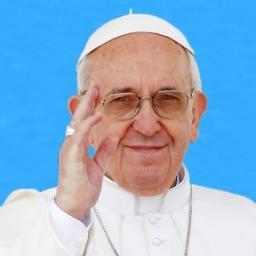Does the Pope Deserve to Be TIME’s Person of the Year?

Pope Francis has just been named TIME magazine’s Person of the Year, someone “who had the greatest impact of the world, for good or bad.” Does he deserve the award, and for good or bad? Analysis from Matthew Bulger.
Pope Francis has become one of the most popular popes in recent memory, as evidenced by his recent naming as TIME’s Person of the Year and the fact that Catholics in America and around the world find themselves increasingly drawn to their new leader. While the pope’s comments about nonbelievers and his apparent focus on reforming the church should be acknowledged, some of this admiration is a bit premature considering the negative impact the Catholic Church still has on the world.
Pope Francis shouldn’t just strive to be the “best of the worst” or someone that can put a humanizing face on an institution that has committed numerous atrocities and peddled ignorance; rather, the pope should work to become an inspirational modern leader that is truly worthy of global acclaim by embracing marginalized communities, opposing religious meddling in government, supporting new technology, and by truly reforming the church and punishing those within the church that committed criminal acts.
One of the most significant actions the pope could take that would show his modern nature and garner widespread support for his office and the church would be an official embrace of contraception and its use worldwide. For an institution that supposedly cares so deeply about human life, the Catholic Church has been a cause of great human suffering because of its opposition to contraception use, as children are born into families that cannot provide for them and parents are guilted into giving up autonomy over their own bodies in order to follow the teachings of the church. While it’s obvious that the church will never embrace abortion or other procedures that end pre-existing pregnancies, this positive step regarding contraception use and the prevention of unwanted pregnancies will improve the lives of untold millions and prove that Pope Francis is willing to put human dignity above the mistaken dogma of his predecessors.
The church has also served as a haven for communities that have been discriminated against by those in power, sheltering illegal immigrants and other individuals that have run afoul of unjust laws or practices by governments. Pope Francis should expand on this noble tradition of protecting the vulnerable by becoming a leading advocate of workplace and employment protections for the LGBTQ community, a group that is faced with prevalent discrimination because of their sexual orientation or gender identity. This doesn’t mean that the church must embrace gay marriage, although such an action would be eminently merciful if a bit contradictory to certain religious teachings, but that it should fight to ensure that all peoples are able to work and find shelter regardless of who they love or how they identify.
Pope Francis can also show how great of a leader he is by combatting one of the great evils of religion: blasphemy laws. While the Catholic Church hasn’t recently worked for the creation and implementation of blasphemy laws, these laws still exist around the world in many nations of different religious beliefs and serve to “protect” religious groups from criticism and inquiry by nonbelievers. By advocating against these anti-democratic laws, Pope Francis would show not only that he supports the right of people to believe and say what they want, but that his church is secure enough in its message and beliefs that it need not limit what others can say about it.
Finally, perhaps the most important topic on which the pope could show leadership and earn widespread admiration and praise is on the child sex abuse issue. The church has been plagued by the actions of priests and administrators who abused young children and hid that abuse away, and the continuing reluctance of the church to seriously punish the perpetrators has been a cause for great shame. Rather than continue to hide these actions and those that are responsible, Pope Francis should pursue justice for the victims by ensuring that all guilty parties are turned over to secular law enforcement agencies and by forcing the church to cooperate with police authorities to the fullest extent in any and all investigations. While this process would be extremely painful for the church and would likely bring about fresh scandals, it would also show that the church takes seriously these crimes and is willing to do whatever it takes to help those that have been affected.
Pope Francis shows many signs of promise, and he should be both thanked for the positive steps he has taken and encouraged to go further with his reforms. The Catholic Church still contains much evil and performs many bad acts, which is why it is so important that the pope live up to the world’s expectations of him by doing as much as he can to help those in need while punishing those within the church that have committed crimes.
